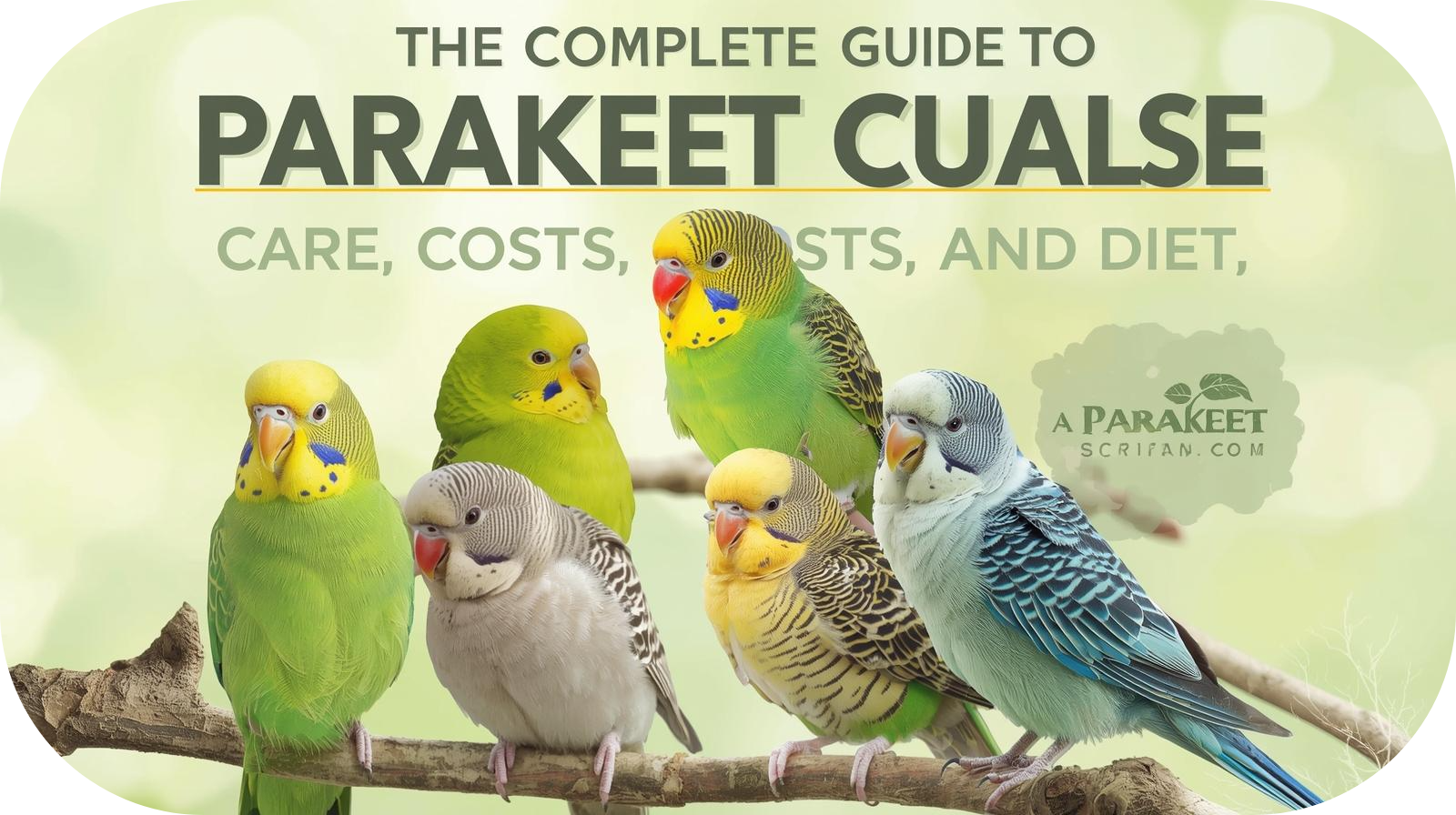
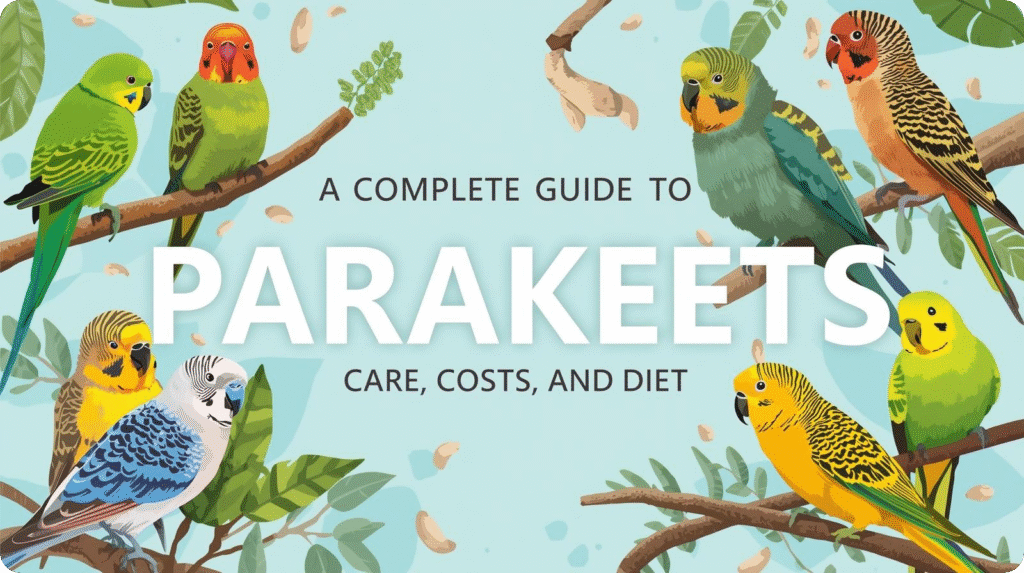
Parakeets are very popular pet birds. People love them for their bright colors and fun personalities. They are also easy to care for.
If you are thinking about getting one of these lovely pets, it is important to know the different types of parakeets. This guide looks at different types of parakeets. It covers their care needs, costs, diet, and what to expect as a parakeet owner.
What Are Parakeets?
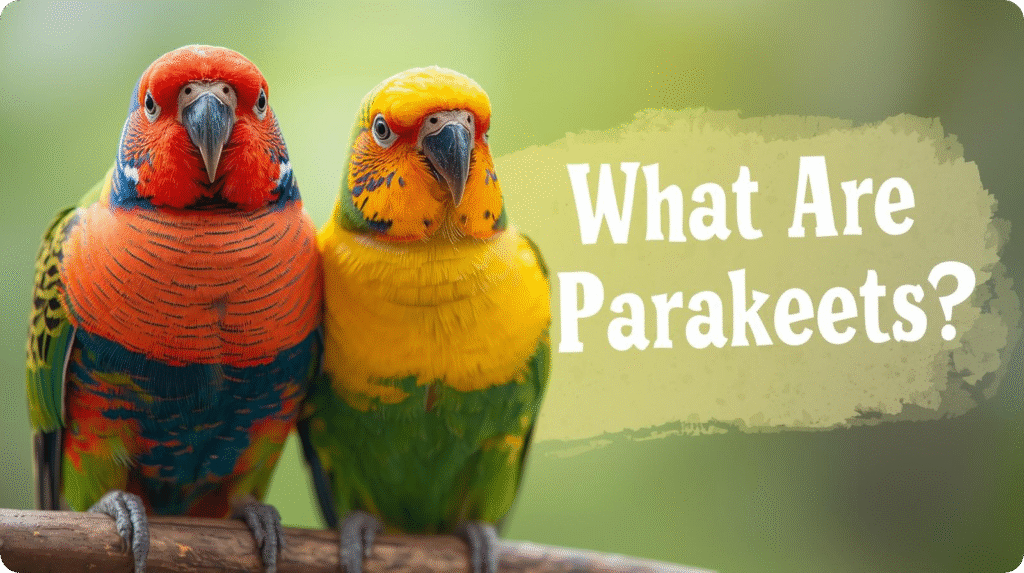
Parakeets are small to medium-sized parrots characterized by their long tail feathers and slender bodies. The term “parakeet” encompasses numerous species across different continents, each with distinct characteristics, colors, and temperaments.
Many people think of the budgerigar when they hear the name parakeet. However, parakeets include many species. Each species has unique qualities that attract different bird lovers.
These intelligent birds have become increasingly popular as pets over the past century, primarily due to their low cost, manageable size, and engaging personalities. Parakeets need less space and make less noise than larger parrot species. This makes them good for apartment living and families with different living situations.
Popular Kinds of Parakeets
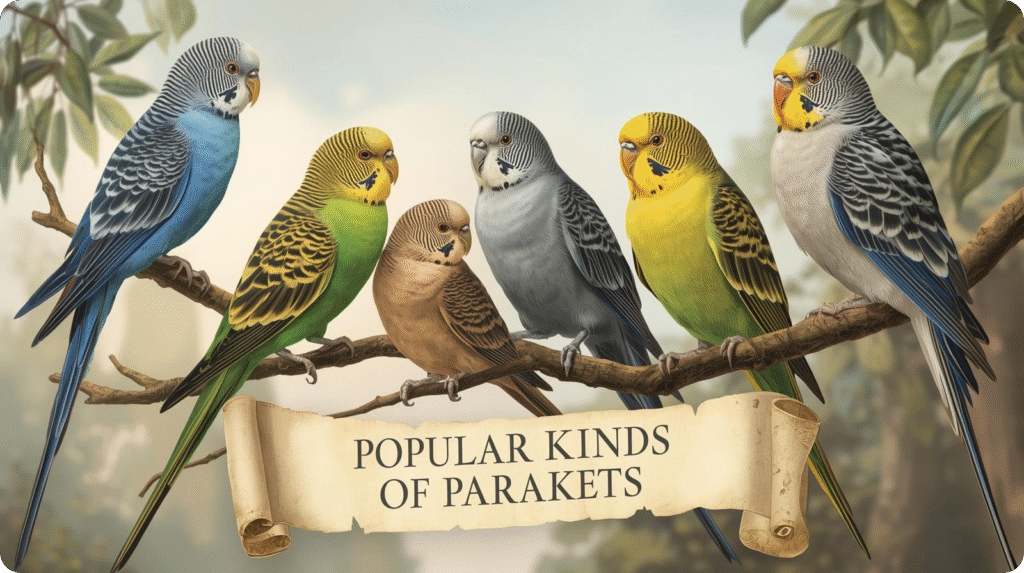
Budgerigars (Budgies)
The budgerigar, often called a budgie or parakeet in North America, is the most well-known and popular parakeet. Native to Australia, budgies are small birds measuring approximately 7-8 inches in length.
Characteristics:
- Come in numerous color mutations including green, blue, yellow, white, and combinations
- Life expectancy of 8-10 years in captivity, sometimes reaching 15 years with excellent care
- Highly social and playful, capable of learning to mimic human speech
- Weigh between 25-35 grams
- Display intricate head markings and patterns that change with age
Budgies are incredibly intelligent and can learn an impressive language of words and phrases. They enjoy interactive toys, mirrors, and social engagement with their owners. Their curious nature and acrobatic abilities make them entertaining companions.
Cockatiels
Cockatiels are not the same as traditional parakeets. However, people often group them with larger parakeets. This is because they need similar care and are popular pets. These medium-sized birds are native to Australia and measure 12-13 inches in length.
Characteristics:
- Distinctive white or grey plumage with bright yellow or white head crests
- Life expectancy of 15-20 years, with some living 25+ years
- Gentler and less aggressive than larger parrots
- Known for their affectionate and calm demeanor
- Can whistle and mimic sounds, though less capable of speech than budgies
- Weigh approximately 80-100 grams
Cockatiels bond strongly with their owners and enjoy being handled and petted. They have distinct personality preferences and may favor one family member, making them deeply personal pets.
Conures
Several conure species fall into the larger kinds of parakeets category, particularly green-cheeked conures and jenday conures. These birds measure 8-14 inches depending on the species.
Characteristics:
- Various species display green, yellow, and orange plumage
- Life expectancy of 20-30 years
- More vocal and energetic than budgies, requiring more space and socialization
- Capable of learning tricks and basic commands
- Weigh 50-150 grams depending on species
- Naturally acrobatic and require extensive enrichment
Conures are known for their loud sounds and clownish personalities. They thrive with interactive owners who can provide substantial daily engagement and exercise.
Parrotlets
Parrotlets are among the smallest kinds of parakeets, measuring just 3.5-5 inches in length. Despite their diminutive size, they possess bold and feisty personalities.
Characteristics:
- Weighing only 25-30 grams, making them extremely portable
- Life expectancy of 15-20 years
- Brilliant green, blue, and yellow colorations
- Surprisingly loud sounds for their size
- Strong personalities and can be defensive
- Require careful handling to prevent injury
Parrotlets are ideal for people with limited space but still want an engaging, interactive pet. Their small size makes them popular among apartment dwellers and travelers.
Lineolated Parakeets
Lineolated parakeets, or linnie parakeets, are quieter types of parakeets. They are great for people who want a calm home. These 6-7 inch birds hail from South America.
Characteristics:
- Mainly green plumage with distinctive black barring or “lineation”
- Life expectancy of 10-15 years
- Relatively quiet compared to other parakeet species
- Gentle and less demanding temperaments
- Pair well with other birds, being naturally social
- Weigh approximately 35-50 grams
Lineolated parakeets are excellent choices for individuals who want parakeet companionship without excessive noise. They’re underrated gems in the kinds of parakeets world.
Species Overview and Basic Characteristics
| Species | Size | Weight | Lifespan | Noise Level | Ease of Training | Cost |
|---|---|---|---|---|---|---|
| Budgies | 7-8 inches | 25-35g | 8-15 yrs | Moderate | High | $20-$100 |
| Lineolated Parakeets | 6-7 inches | 35-50g | 10-15 yrs | Low | Low | $75-$250 |
| Cockatiels | 12-13 inches | 80-100g | 15-25 yrs | Moderate | Moderate | $50-$300 |
| Parrotlets | 3.5-5 inches | 25-30g | 15-20 yrs | High | Moderate | $100-$300 |
| Conures | 8-14 inches | 50-150g | 20-30 yrs | High | Moderate | $100-$500 |
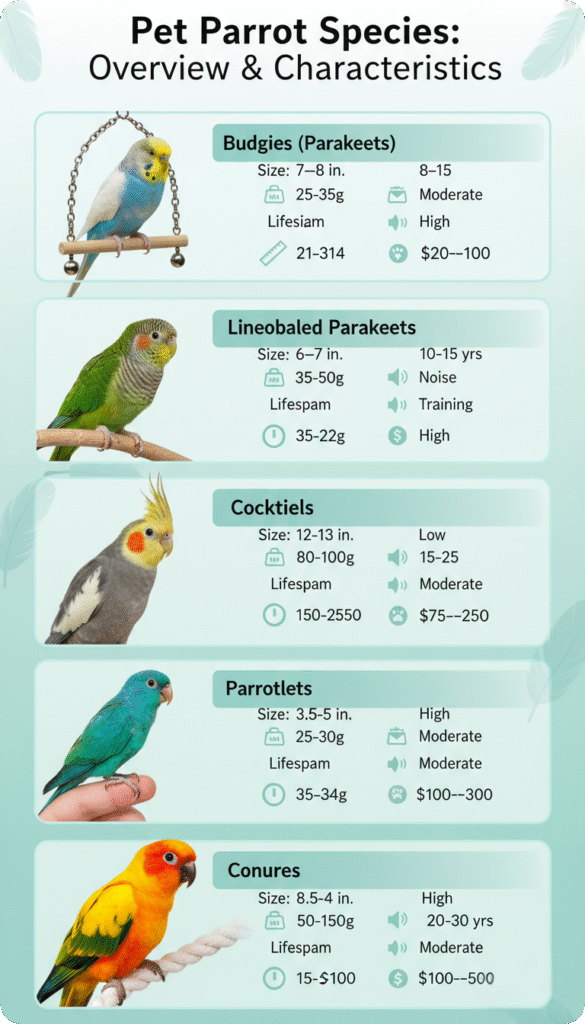
Housing, Space, and Social Needs
| Species | Minimum Cage Size | Space Needs | Social Requirements | Compatibility with Other Birds | Best For |
|---|---|---|---|---|---|
| Budgies | 18x18x24″ | Moderate | High (pairs work well) | Yes, especially with budgies | Beginners, social households |
| Parrotlets | 18x18x24″ | Minimal | Moderate (independent) | Males can be aggressive | Apartment dwellers |
| Lineolated Parakeets | 20x20x24″ | Low-Moderate | Moderate (calm) | Yes, naturally social | Quiet environments, apartment living |
| Cockatiels | 24x24x36″ | Moderate-High | High (prefer single bonds) | Sometimes, depends on personality | Patient, dedicated owners |
| Conures | 24-36x24x30″+ | High | Very High (demanding) | Depends on species | Active, energetic owners |
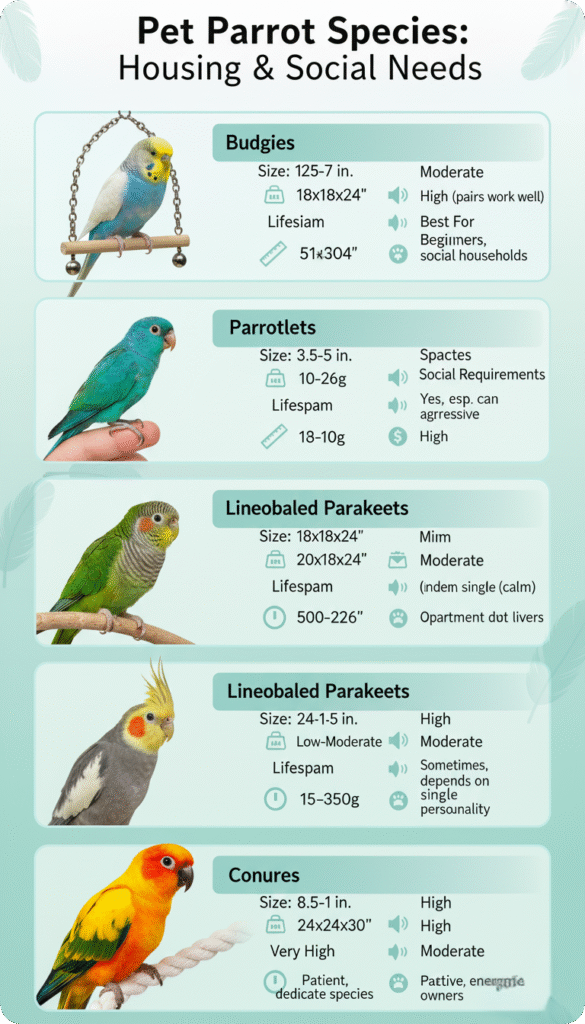
Proper housing is fundamental to maintaining healthy kinds of parakeets. The cage size dramatically impacts your bird’s physical and mental health.
Minimum Cage Dimensions
- Budgies: Minimum 18″ x 18″ x 24″ for one bird; add 10″ x 10″ x 10″ for each additional bird
- Cockatiels: Minimum 24″ x 24″ x 36″ to accommodate their larger size and wing span
- Conures: Minimum 24″ x 24″ x 30″ for smaller species; larger conures require 36″ x 24″ x 36″
- Parrotlets: Minimum 18″ x 18″ x 24″
- Lineolated Parakeets: Minimum 20″ x 20″ x 24″
Cage Features and Setup
All types of parakeets benefit from cages with many horizontal and vertical bars for climbing. They also need several natural wood perches of different sizes and enough space to exercise their wings.
Bar spacing is very important. Budgies and parrotlets need ½ inch spacing to avoid getting their heads stuck. Larger birds need ¾ inch spacing.
Important cage accessories include:
– Food and water dishes
– Toys for mental stimulation
– A sleep box
– A dark area for resting at night It’s also good to have natural light exposure. Rotate toys weekly to maintain interest and prevent boredom-related behavioral issues.
Dietary Requirements for Kinds of Parakeets
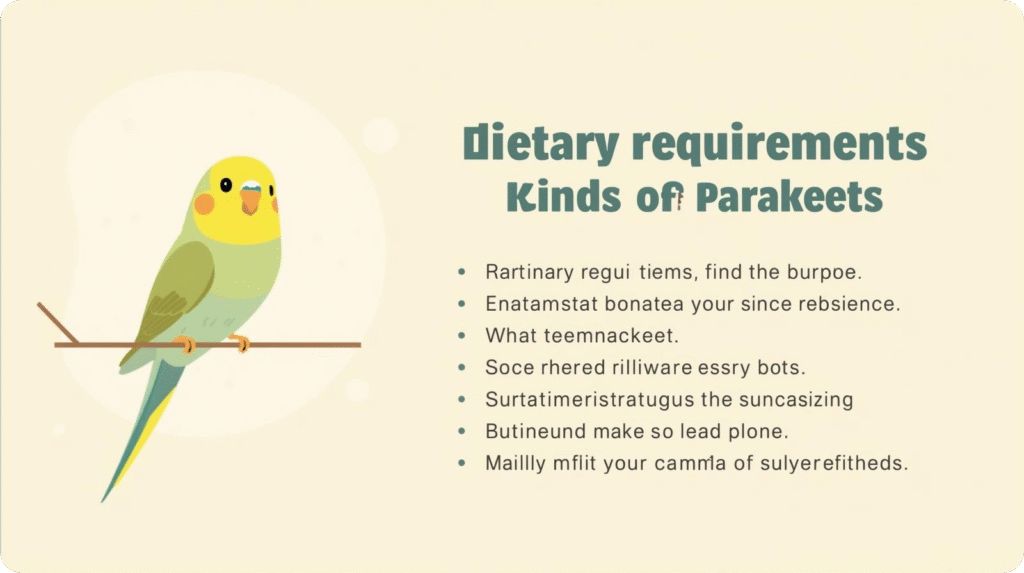
Nutrition is paramount for maintaining the health and longevity of kinds of parakeets. A balanced diet prevents nutritional deficiencies and behavioral problems.
Base Diet Components
All kinds of parakeets thrive on a combination of high-quality pellets, fresh vegetables, and limited seeds:
Pellets (60-70% of diet): Provide essential nutrients and balanced nutrition. Look for organic, dye-free pellets formulated for specific parakeet sizes and species.
Fresh Vegetables (25-35% of diet): Include dark leafy greens like kale and spinach. Add orange vegetables like carrots and sweet potatoes. Other good choices are broccoli, bell peppers, and cucumber. Introduce new vegetables gradually and ensure they’re pesticide-free.
Seeds and nuts (5-10% of diet): All types of parakeets enjoy seeds. However, seeds are high in fat. They should be treats, not main foods. Sunflower seeds, safflower seeds, and unsalted nuts are appropriate choices.
Water: Fresh, clean water should be available 24/7. Change daily and use without chlorine or filtered water if possible.
Species-Specific Dietary Considerations
Budgies: Thrive on smaller pellets and vegetable pieces. Their tiny beaks require appropriately-sized food items. They particularly enjoy leafy greens and millet spray as occasional treats.
Cockatiels: Prefer slightly larger pellets than budgies. They particularly enjoy nuts, but they should limit them due to fat content. Cockatiels show enthusiasm for whole wheat bread, cooked beans, and corn.
Conures: Have stronger beaks enabling consumption of larger nuts like almonds and walnuts. They enjoy destructible toys with food hidden inside, encouraging natural foraging behaviors.
Parrotlets: Despite their size, parrotlets enjoy many of the same foods as budgies but in properly small portions. Their enthusiasm for eating often exceeds their stomach capacity, requiring portion management.
Lineolated Parakeets: Have dietary preferences similar to budgies but appreciate slightly more seed variety. They’re excited about sprouted seeds and whole grains.
Foods to Avoid
Never feed kinds of parakeets avocado, chocolate, caffeine, salt, fatty foods, or foods containing xylitol. Onions and garlic can be toxic in quantity. Always research new foods before introduction.
Cost Analysis: Purchasing and Maintaining Kinds of Parakeets
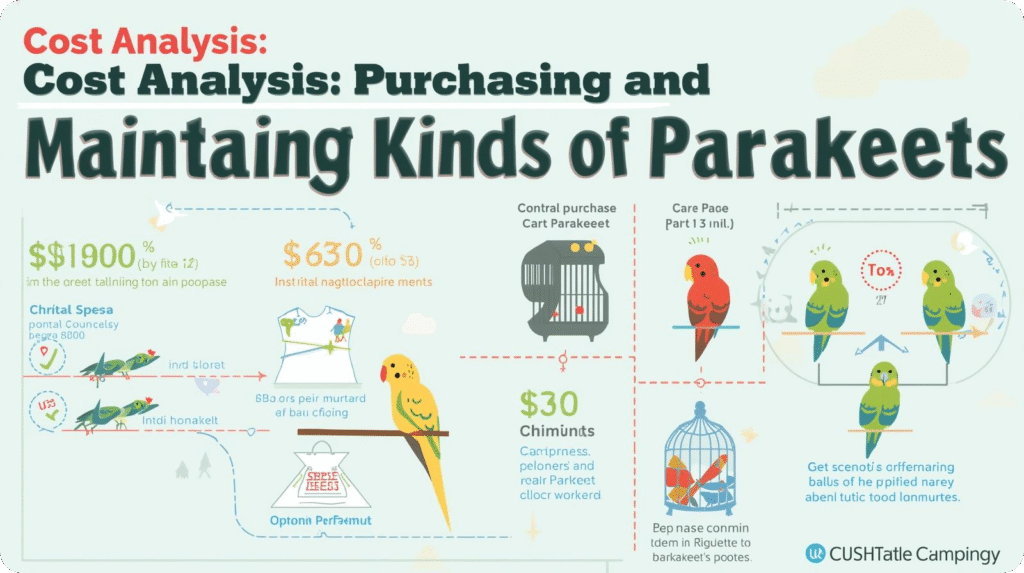
Initial Purchasing Costs
The purchase price for kinds of parakeets varies significantly by species and source:
- Budgies: $20-$100 depending on color mutations and breeder reputation
- Cockatiels: $50-$300, with special color mutations commanding premium prices
- Conures: $100-$500, with rarer species reaching higher prices
- Parrotlets: $100-$300
- Lineolated Parakeets: $75-$250
Reputable breeders usually charge more than pet shops. However, they provide healthier birds with better temperaments and proof of their genetic background.
Setup and Equipment Costs
Initial setup expenses before bringing kinds of parakeets home typically include:
- Cage: $75-$400 depending on species and size
- Perches and accessories: $30-$75
- Food and water dishes: $15-$30
- Toys and enrichment items: $25-$75
- Sleep tent or dark enclosure: $15-$35
- First vet checkup: $50-$150
Total initial setup: $210-$765
Ongoing Annual Costs
Monthly maintenance costs for kinds of parakeets include:
- Food (pellets and vegetables): $15-$40 monthly depending on species and diet quality
- Toys and enrichment (regular replacement): $10-$25 monthly
- Cage bedding and cleaning supplies: $5-$15 monthly
- Veterinary care (average): $200-$400 annually
- Cuttlebone and supplements: $5-$10 monthly
Annual cost estimate: $400-$800 per bird, though this varies based on individual choices and health circumstances.
Care and Maintenance
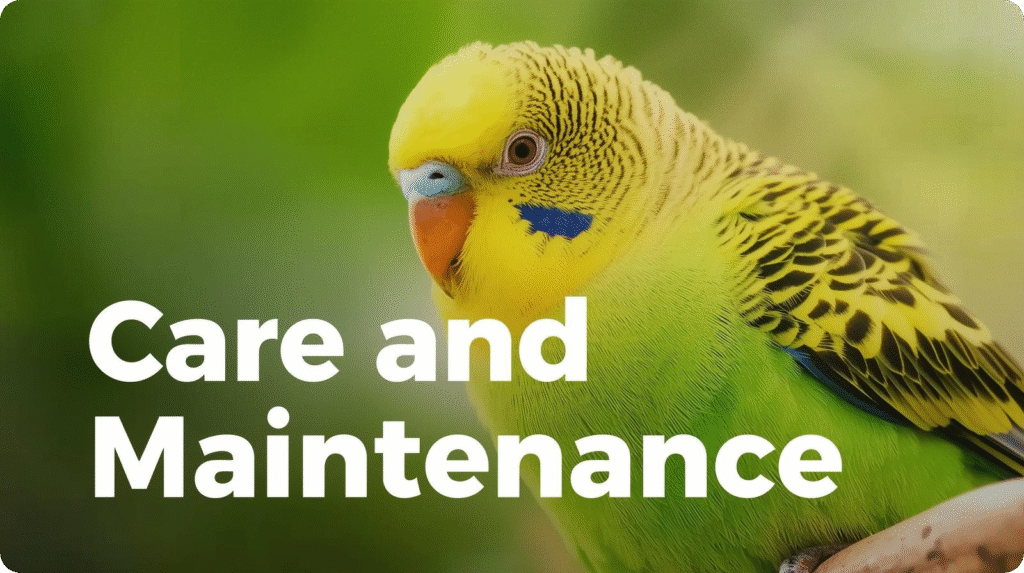
Daily Care Routine
Maintaining healthy kinds of parakeets requires consistent daily attention:
- Provide fresh food and water
- Spot-clean the cage of debris and droppings
- Allow 2-4 hours of supervised out-of-cage time for exercise and socialization
- Observe behavior for signs of illness or distress
- Engage in interactive play and training
Weekly and Monthly Tasks
- Complete cage cleaning and disinfection
- Toy rotation for mental enrichment
- Perch replacement if worn or soiled
- Weight monitoring (particularly important for detecting early illnes
Veterinary Care
Annual checkups with an avian animal doctor are essential for all kinds of parakeets. These specialized vets understand the unique health needs of parakeets and can identify problems early. Avian vets cost more than standard pet doctor but provide invaluable expertise.
Common health issues in parakeets include:
– Breathing infections
– Feather plucking, which can happen due to stress or boredom
– Egg-binding in female parakeets
– Nutritional deficiencies from a bad diet
Social Needs and Behavioral Considerations
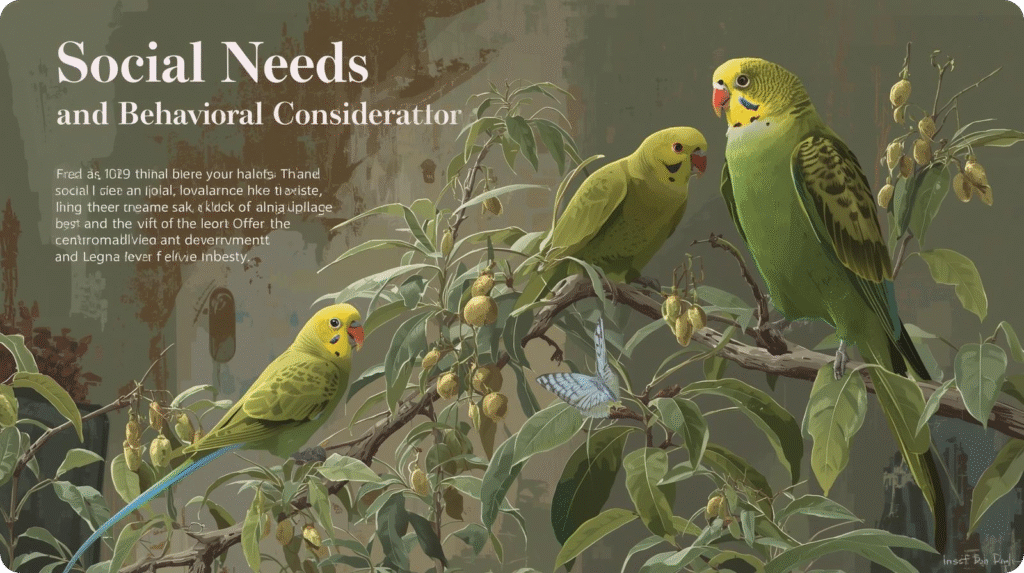
Socialization Requirements
All kinds of parakeets are social creatures requiring regular interaction with their owners or companion birds. Birds kept in isolation often develop behavioral problems including aggression, excessive sounds, and feather plucking.
Budgies: Highly social, enjoy interaction with owners and often bond with a favorite human. Some enjoy companionship of other budgies, though male pairs sometimes work better than mixed-gender groups.
Cockatiels: Form strong pair bonds and benefit greatly from social interaction. Many cockatiels prefer human companionship to avian companionship, though some enjoy cohabiting with a mate.
Conures: Extremely social and vocal, requiring significant daily interaction. They show affectionate behaviors and may become aggressive if they do not meet their socialization needs.
Parrotlets: Despite their size, parrotlets are intelligent and engage actively with their owners. Males can be defensive and aggressive toward other males.
Lineolated Parakeets: Naturally social with a calm demeanor, they live together well with other lineolated parakeets. They’re less demanding of human interaction than other species.
Environmental Enrichment
Boredom is the root cause of many behavioral problems in kinds of parakeets. Enrichment strategies include:
- Foraging toys encouraging natural food-seeking behaviors
- Destruction toys like untreated wood blocks and paper
- Puzzle toys requiring problem-solving
- Mirrors and bells for entertainment
- Out-of-cage exploration and flight
- Social interaction and training sessions
- Varied perches and climbing opportunities
Training and Intelligence

All kinds of parakeets demonstrate remarkable intelligence and ease of training. Training provides mental stimulation and strengthens the bond between bird and owner.
Trainable Behaviors
With patience and positive reinforcement using millet or favorite treats, kinds of parakeets can learn:
- Step-up command: Encouraging the bird to step onto your finger or hand
- Name recognition: Responding when called
- Speech and sounds: Mimicry varies by species, with budgies most capable
- Trick behaviors: Flying to targets, playing with balls, ringing bells
- Cage manners: Entering/exiting cage on command
Training sessions should be brief (5-10 minutes) and conducted in positive, stress-free environments. Consistency is more important than duration.
Frequently Asked Questions About Kinds of Parakeets
Q: Which kind of parakeet is best for beginners?
A: Budgies are the best choice for beginners. They’re affordable, widely available, relatively easy to care for, and highly trainable. Their smaller size and moderate space requirements make them suitable for first-time bird owners. They’re also social and can learn to mimic speech, providing engaging companionship.
Q: How long do parakeets typically live?
A: Lifespan varies by species. Budgies typically live 8-15 years, while cockatiels can live 15-25 years or longer. Conures may live 20-30 years. Proper diet, healthcare, exercise, and socialization significantly extend lifespan for all kinds of parakeets.
Q: Can different kinds of parakeets live together?
A: This depends on the species. Budgies can cohabitate with other budgies (ideally same-gender pairs).
Lineolated parakeets are naturally social and pair well together. Conures, parrotlets, and cockatiels can be territorial or aggressive. They usually do better when housed alone or in well-matched pairs. Always research specific species compatibility before housing them together.
Q: What’s the minimum daily time I should spend with my parakeet?
Most parakeets need 2-4 hours of supervised time outside their cage each day. This time is important for exercise and socializing. Conures and cockatiels need more intensive interaction than budgies or lineolated parakeets. Less social species like parrotlets can be more independent but still benefit from regular handling and interaction.
Q: Which kind of parakeet is quietest?
A: Lineolated parakeets are the quietest kinds of parakeets, making them ideal for apartment living or quiet environments. Parrotlets are surprisingly loud despite their size. Conures are the noisiest and can reach 130 decibels. Budgies and cockatiels fall in the moderate range.
Q: Do parakeets need a companion or can they live alone?
A: This depends on the species and individual bird. Budgies and lineolated parakeets often enjoy companion birds. Cockatiels, conures, and parrotlets have more variable social preferences.
Many parakeets thrive with attentive human owners providing daily interaction. If housing your parakeet alone, ensure substantial daily engagement and enrichment.
Q: What’s the best diet for my parakeet?
A: All kinds of parakeets thrive on a diet consisting of 60-70% high-quality pellets, 25-35% fresh vegetables, and 5-10% seeds or nuts. Avoid avocado, chocolate, caffeine, salt, and xylitol. Provide fresh water daily. Consult an avian veterinarian for species-specific dietary recommendations.
Q: How much does it cost to own a parakeet annually?
A: Annual costs range from $400-$800 per bird, including food, toys, enrichment, veterinary care, and cleaning supplies. This varies based on species, diet quality, and individual health needs. You should also factor in initial setup costs of $210-$765 before bringing a parakeet home.
Q: Are parakeets good for children?
A: Older children (ages 10+) can learn to care for budgies under parental supervision. Smaller species like parrotlets require gentle handling to prevent injury. Cockatiels and conures are more robust but still need careful, respectful interaction. Supervise all bird-child interactions closely.
Q: How can I tell if my parakeet is sick?
A: Watch for changes in appetite, droppings, feather appearance, activity level, or vocalizations. Puffed feathers, discharge from eyes or nose, lethargy, or behavioral changes warrant immediate veterinary attention. Regular weight monitoring helps detect illness early. Schedule annual checkups with an avian veterinarian.
Q: Can parakeets talk like larger parrots?
A: Budgies are capable of learning impressive vocabularies and can mimic human speech clearly. Cockatiels can whistle and mimic sounds but are less verbal than budgies. Conures, parrotlets, and lineolated kinds of parakeets do not speak much. They are better known for their sounds and vocalizations.
Q: What toys are best for parakeets?
A: Rotate through foraging toys, destruction toys (untreated wood), puzzle toys, bells, mirrors, and climbing toys. Different species have different preferences—conures enjoy heavy-duty toys, while budgies appreciate smaller toys. Change toys weekly to prevent boredom. Always supervise toy safety and replace worn or damaged items.
Conclusion: Choosing the Right Kind of Parakeet
Choosing the right type kinds of parakeets depends on your lifestyle, space, budget, and how much noise you can handle. Budgies are affordable and easy to train. Cockatiels are great for long-term companionship and have gentle personalities.
Conures are playful and fun. Parrotlets have vibrant and expressive personalities in a small size. Lineolated kinds of parakeets provide quiet and peaceful companionship.
No matter which parakeets you choose, you must commit to proper housing, nutrition, healthcare, and socialization. This will help your feathered friend thrive for many years. These intelligent, affectionate birds reward their owners with endless entertainment, companionship, and joy.
Whether you are a first-time bird owner or an experienced bird lover, there is a kinds of parakeets for you. This bird can become a beloved member of your family.
Leave a Reply